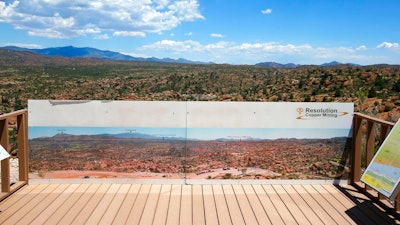
FLAGSTAFF, Ariz. (AP) — The U.S. Forest Service is scheduled to release an environmental review that will pave the way to create one of the largest copper mines in the U.S., against the wishes of a group of Apaches who have been trying for years to stop the project.
The expected Friday publication of the document will start a 60-day clock for a tract of land in the Tonto National Forest east of Phoenix to be turned over to international mining giant Rio Tinto and its subsidiary, Resolution Copper.
A judge late Thursday denied a request from Apache Stronghold, a group led by former San Carlos Apache Chairman Wendsler Nosie Sr., to halt the publication until the larger question over who legally owns the land is settled.
U.S. District Court Judge Steven Logan in Phoenix said he recognizes “the anxiety that having one's sacred land taken from them and used for purposes that run counter to their spiritual beliefs, might cause.”
But Logan said the Forest Service and other defendants also have a right to respond to the allegations, and he saw no proof they had been served. He set a Jan. 27 hearing.
Environmentalists contend the Forest Service is being pressured to push the review over the finish line before Donald Trump leaves office, complicating efforts to stop the project.
The Forest Service said that's not true, while the mining company contends the publication already is delayed by months.
The mountainous land near Superior, Arizona, is known as Oak Flat or Chi'chil Bildagoteel. It's where Apaches have harvested medicinal plants, held coming-of-age ceremonies and gathered acorns for generations.
An area where dozens of warriors leapt to their deaths from a ridge adjacent to the proposed copper mine, rather than surrender to U.S. forces during westward expansion, is protected as a special management area.
Nosie's group alleged violations of religious freedom and constitutional rights in the federal lawsuit filed this week. It also contends the Forest Service legally can't transfer the land because it belongs to Apaches under an 1852 treaty.
Nosie said he's hopeful the court or politicians will take action to preserve the area as it is.
“I think with a new Congress, new administration, they will be able to take a new look at it based on the Constitution, our religion and based on the consequences of having this mine that's looking to devastate and destroy this area forever,” Nosie told The Associated Press this week.
The land swap was approved in December 2014, tucked into a must-pass defense bill. The late Republican Sen. John McCain, a major recipient of Rio Tinto campaign contributions, backed it. Before that, stand-alone bills never gained Congress' approval.
Resolution Copper is set to receive 3.75 square miles (9.71 square kilometers) of Forest Service land in exchange for eight parcels the company owns elsewhere in Arizona.
U.S. Rep. Raul Grijalva of Arizona and Sen. Bernie Sanders of Vermont, both Democrats, tried unsuccessfully to reverse the land swap. Grijalva said this week that it remains one of his top priorities.
Resolution Copper said it has spent about $2 billion so far to gain access to the mine and conduct studies. More time and money will go into securing permits and constructing the mine, which wouldn't begin operating for at least 15 years.
The company said it has committed to spending $100 million for cultural heritage and recreation projects, among other things, to help ease the impacts of mining. It has tweaked its plans after receiving input from other tribes, some of whom have members who were hired to help inform archaeological surveys.
The Oak Flat Campground would remain open to the public until it's no longer safe for people to go there. Eventually, the mine would swallow it.
The project proposal calls for the use of block caving, a method Resolution Copper maintains is safe and environmentally sound, to extract the remaining ore from depths as much as 7,000 feet below ground level.
Through this method, ore is selectively mined in a controlled way as the ground underneath it collapses under its own weight.
Resolution Copper has said the mine could have a $61 billion economic impact over the project’s 60 years and create 1,500 jobs — points that supporters repeatedly have stressed.
Environmentalists are concerned about the toxic waste that would be dumped on nearby wildlands, and the potential for groundwater contamination.
Rio Tinto was criticized last year for blasting through 46,000-year-old aboriginal rock shelters in Australia’s Juukan Gorge. The company’s CEO and two other top executives were fired.






















